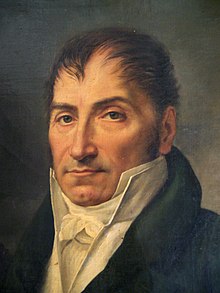Jean-Baptiste Cavaignac
Jean-Baptiste Cavaignac (born February 23, 1762 in Gourdon , Département Lot , † March 24, 1829 in Brussels ) was a French politician and member of the National Convention and father of Louis-Eugène Cavaignac .
Life
He was a lawyer at the parliament in Toulouse in 1789 , joined the revolution and was elected to the convent in 1792, where he voted for the death of the king, but without belonging to the extreme Robespierre party .
As a general, he tried in vain during the uprising of the Mountain Party of 1st Prairial III (May 20, 1795) to keep the rebellious crowd from the meeting room of the convention. On 13th Vendémiaire (October 5th, 1795) he commanded the convent troops under Bonaparte and helped crush the uprising of the sections.
While on the board of directors he was a member of the Council of Five Hundred, city toll collector, finally lottery administrator. Under the consulate he was sent to the Arab seaport of Muscat as extraordinary general commissioner, but without doing anything there himself.
Appointed in 1806 by Joseph Napoleon as domain administrator in Naples , his successor, Murat , appointed him to the Council of State. When Napoleon Bonaparte called back the French employed abroad, Cavaignac also went back to France and was appointed prefect of the Somme department in March 1815 , but had not yet taken up this post when the second restoration occurred. Due to the amnesty law of January 12, 1816, as a regicide, Cavaignac felt compelled to emigrate to Brussels, where he died on March 24, 1829.
| personal data | |
|---|---|
| SURNAME | Cavaignac, Jean-Baptiste |
| BRIEF DESCRIPTION | French general and member of the National Convention |
| DATE OF BIRTH | February 23, 1762 |
| PLACE OF BIRTH | Gourdon |
| DATE OF DEATH | March 24, 1829 |
| Place of death | Brussels |
